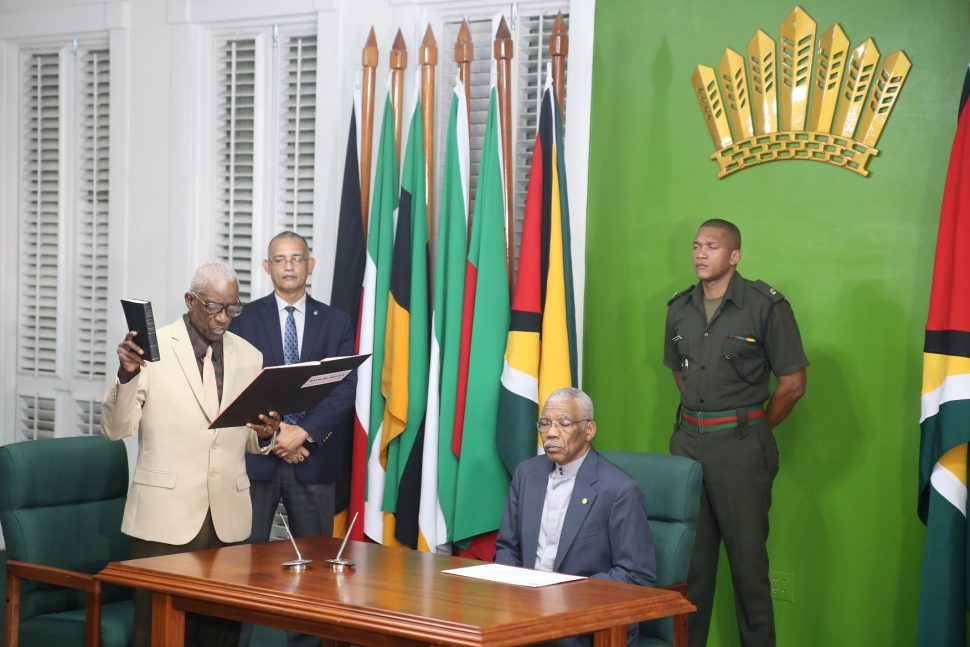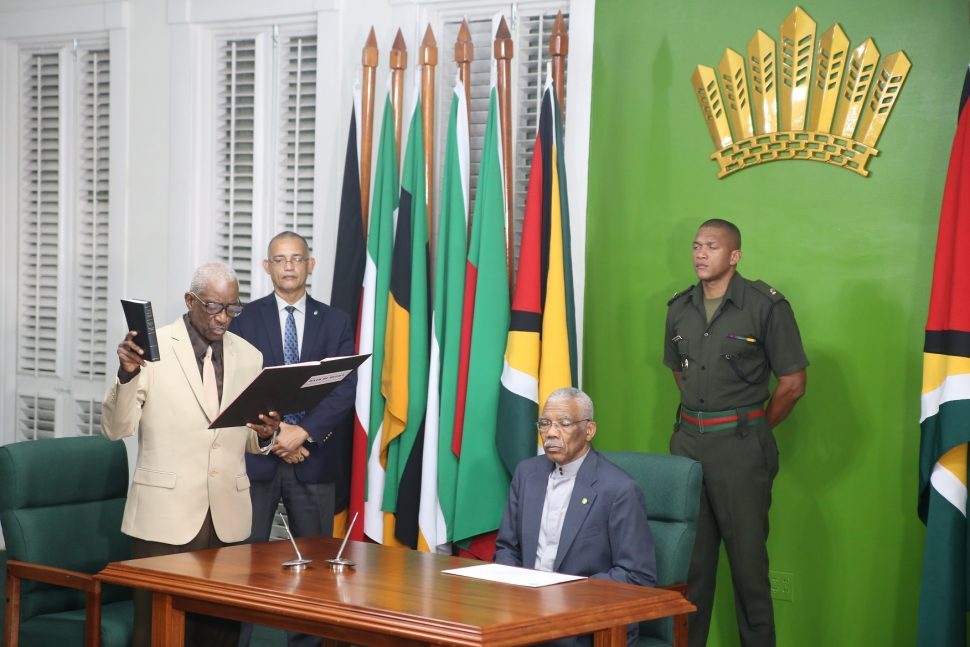The Caribbean Court of Justice (CCJ) today found that the unilateral process by President David Granger to appoint Justice (retired) James Patterson as Chairman of GECOM was flawed.
A summary of its findings was read this morning by President of the court, Justice Adrian Saunders at its headquarters in Port-of-Spain.
The summary noted that the historical evolution of reforms to the constitution for the Guyana Elections Commission (GECOM) moved towards inclusion and consensual discourse as opposed to unilateralism and arbitrariness that characterised the process for Justice Patterson.
Several of the justices concurred that President Granger should have provided reasons for the rejection of three lists containing 18 names.
The court will now hear submissions from both sides on the consequential orders that should be made.
PPP member Zulfikar Mustapha had filed an application in the High Court, contending among other things that the president had no power to make a unilateral appointment once a list of six names had been submitted to him.
Among the issues which the court had to determine was whether the appointment of Justice Patterson was unconstitutional as the applicant contended that the President had no power to make a unilateral appointment once a list of six names was submitted to him.
The court ruled that the President had the power, under Article 161(2) of the Constitution, to reject the list submitted by the Opposition Leader if it is unacceptable to him and to resort to the proviso of that article and choose a person as Chairman of GECOM who is, was, or is qualified to be appointed as a judge in Guyana or the Commonwealth.
This decision was then upheld by the Court of Appeal and the case then moved to the CCJ.
A release from the CCJ follows:
The Caribbean Court of Justice (CCJ) today ruled that the process through which Reverend Justice (Retired) James Patterson was appointed Chairman of the Guyana Elections Commission (GECOM) by His Excellency, Brigadier David Granger, President of Guyana was flawed and in breach of Guyana’s Constitution. The Court emphasized, however, that nothing in its judgment was intended “in the slightest degree” to cast aspersions on Justice Patterson’s competence and suitability for the position of Chairman of GECOM. Nor was there any suggestion that President Granger had not acted in good faith.
The Constitution stated that the Chairman was to be appointed by the President from a list of six persons, not unacceptable to the President, submitted by the Leader of the Opposition. Three lists, with a total of 18 nominees for the post of the GECOM Chairman, were submitted for consideration by the Leader of the Opposition. President Granger rejected the names on all three lists. The first list was rejected as, in the President’s view, the qualifications and experience of the nominees did not seem to conform to the requirements outlined in the Constitution. The second list was rejected by the President, as he found it to be unacceptable within the meaning of the Constitution and the criteria that he had set out in a ‘Statement of Qualities of the Chairman of the GECOM’ that he had submitted to the Leader of the Opposition.
Prior to the submission of the third list, the Government and the Opposition met and consulted on the “way forward on the selection and appointment of the Chairman”. After that meeting, the third list was submitted to the President and rejected as being unacceptable.
After disapproving the third list, the President advised the Leader of the Opposition that he would select a Chairman himself. This course of action is provided for by the Constitution if the Leader of the Opposition failed to present a suitable nominee. The President justified his decision to appoint a Chairman himself in part on the ground that it would not serve the public’s best interest to further delay the appointment. In determining the main issue in the case, the Court looked first at the proper meaning of Article 161(2) of Guyana’s Constitution. That Article sets out the requirements to be satisfied for a person to be eligible for appointment as GECOM Chairman. It also sets out the general process for selecting the Chairman.
To determine the meaning, the Court looked at the drafting history of Article 161(2), observing that changes had been made to it to promote consensus and inclusiveness by involving the Leader of the Opposition in the selection process. The CCJ also stressed that “an onus is placed on the President not to find a nominee unacceptable merely because the nominee is not a choice the President would have himself made. The President should only find a nominee unacceptable for some good reason on objective grounds”. It was also found that the President could not, as a precondition to considering a nominee, include eligibility requirements that were additional, or different, from those stated in the Constitution.
The Court therefore found that the process was flawed and in breach of the Constitution. In a concurring judgment, Mme. Justice Rajnauth-Lee stated that by giving reasons why nominees are rejected, the President will engender greater public trust and confidence in the Elections Commission. Mr. Justice Anderson, also in a concurring judgment, agreed that the process was flawed but did not think that, at the consultative stage, it was necessary for reasons to be given.
The Court concluded that the most sensible approach to the process of appointing the Chairman of GECOM is for the Leader of the Opposition and the President to communicate with each other in good faith and, perhaps, even meet to discuss eligible candidates for the position of Chairman before a list is submitted formally. The CCJ having concluded that the appointment was in breach of the Constitution, the court invited both sides to present further arguments on how the issue should be rectified.
The full judgment of the Court, and a judgment summary, are available at www.ccj.org.


